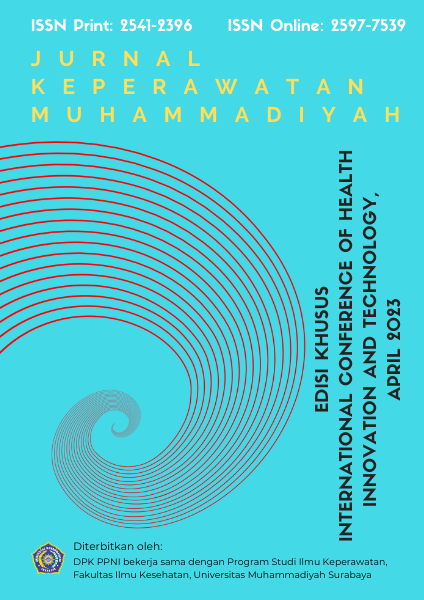PEER GROUP EDUCATION ON PHBS ABOUT WASTE DISPOSING IN THE GIRLS' DORMITORY
DOI:
https://doi.org/10.30651/jkm.v0i0.17896Keywords:
Behaviour (Knowledge, Attitude, and Action) PHBS Waste Disposes, Peer Group Education.Abstract
Objective: Healthy problems are often experienced by students in Islamic boarding schools among others diarrhea, typus, and cholera. This is influenced by the behavior of throwing waste, especially in dormitories, which still need special attention. Peer group education as an effort to improve the behavior of throwing waste in its place. It aims to was to determine the influence of peer group education on PHBS about taking out waste.
Methods: The research design used pra eksperiment with one group pretest posttest, a population of 189 santriwati at 4I Ainusyams Ponpes Darul Ulum girls' dormitory, approach purposive sampling technique with the criteria for class XI senior high school students and participated in all activities as many as 34 Santriwatiwati. The instrument of measuring knowledge and attitudes uses questionnaires, while the action are carried out in the way of observation. The analysis is the wilcoxon test (α<0.05).
Results: Knowledge 0.015, attitude 0.011, and to do 0.000, while the behavior of disposing of waste P value 0.000 (p-value ≤ α) means that there is an influence of peer group aducation on PHBS's behavior about disposing of waste.
Conclusion: This is based on the respondent's desire to improve the degree of health where the peer group education method is considered effectively applied in the dormitory in overcoming problems that occur in the dormitory, especially related to changes in health behavior.
References
Darise, D. S. (2021). Pengaruh Peer Education Terhadap Perilaku Kebiasaan Konsumsi Jajanan pada Remaja di Kabupaten Gorontalo. Universitas Hasanuddin Makassar.
Dobiki, J. (2018). Analisis Ketersedian Prasarana Persampahan di Pulau Kumo dan Pulau Kakara di Kabupaten Halmahera Utara. Jurnal Spasial Volume, 5(2), 220–228.
Ishana Balaputra, & Suharta. (2021). Studi Perilaku Hidup Bersih dan Sehat (PHBS) Pada Siswa di Pondok Pesantren Al-Qodiri Jember. Medical Jurnal of Al Qodiri, 6(2), 73–80. https://doi.org/10.52264/jurnal_stikesalqodiri. v6i2.95
Lestari, U. H. N. (2020). Penanaman Nilai Karakter Santriwati Melalui Kegiatan Roan Di Pondok Pesantren Putri Darul Ulum Suruh. In Skripsi Publikasi. Intitut Agama Islam Negeri Salatiga
Masita. (2019). Membangun Kapasitas Kelembagaan Pondok Pesantren di Asshirathal Mustaqim Baru-Baru Tanga Pangkep, Provinsi Sulawesi Selatan dalam Menciptakan Perilaku Hidup Bersih dan Sehat Santriwati. Universitas Negeri Sunan Ampel Surabaya.
Notoatmojo. (2014). Pusat Pendidikan Sumber Daya Manusia Kesehatan. Syria Studies, 7(1), 37-72. Octa, A. (2019). Hubungan Pengetahuan dan Sikap Terhadap Perilaku Cuci Tangan pada Masyarakat Kelurahan Pegirian. Jurnal
PROMKES, 7(1), 1.
Purwanto, B. (2021). Pelaksanaan PHBS di Pesantren.
https://promkes.kemkes.go.id/pelaksanaan-
phbs-di-pesantren
Rayma, S. T. (2020). Dampak Limbah Domestik
Repository.Uinjkt.Ac.id. Universitas Islam
Negeri Syarif Hidayatullah Jakarta.
Sarwono, 20008. (2010). Teori dan Pengukuran Pengetahuan Sikap, dan Perilaku Manusia. Wawan Dan Dewi M.Yogyakarta: Nuha
Medika, 2011), 5–24.
Wawan, A dan Dewi, M. (2014). Teori dan
Pengukuran Pengetahuan Sikap, dan Perilaku Manusia, 11–47.
Downloads
Published
Issue
Section
License
- Penulis tetap memegang hak atas karyanya dan memberikan hak publikasi pertama kepada jurnal ini yang secara simultan karya tersebut dilisensikan di bawah:Â Creative Commons Attribution-ShareAlike 4.0 International (CC BY-SA 4.0)













